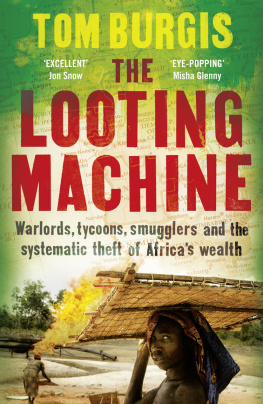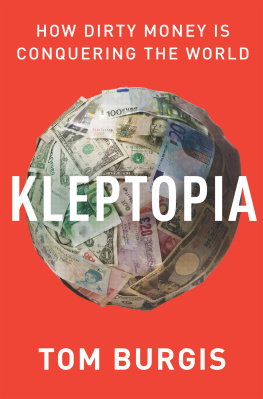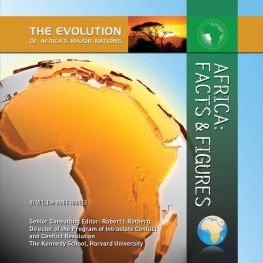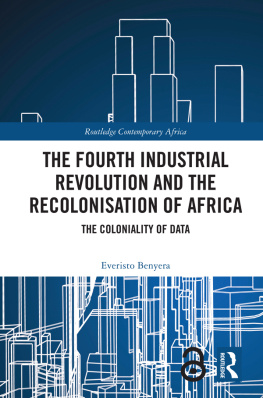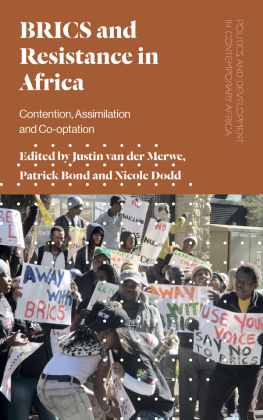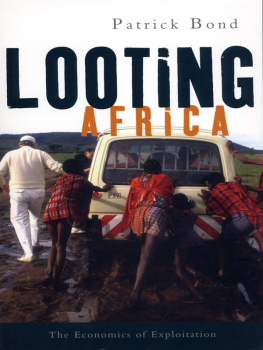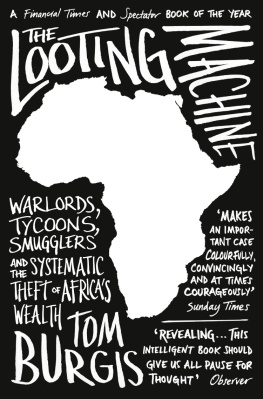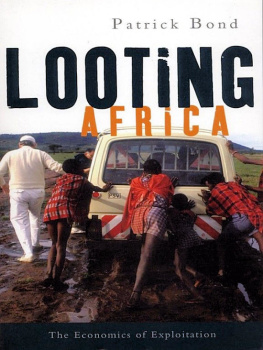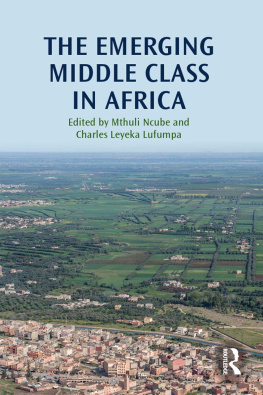Contents
Australia
HarperCollins Publishers (Australia) Pty. Ltd.
Level 13, 201 Elizabeth Street
Sydney, NSW 2000, Australia
http://www.harpercollins.com.au
Canada
HarperCollins Canada
2 Bloor Street East 20th Floor
Toronto, ON, M4W, 1A8, Canada
http://www.harpercollins.ca
New Zealand
HarperCollins Publishers (New Zealand) Limited
P.O. Box 1
Auckland, New Zealand
http://www.harpercollins.co.nz
United Kingdom
HarperCollins Publishers Ltd.
1 London Bridge Street
London, SE1 9GF
http://www.harpercollins.co.uk
United States
HarperCollins Publishers Inc.
195 Broadway
New York, NY 10007
http://www.harpercollins.com
L ITTLE BUT FEAR and sewage flows down the precipitous slope that separates Angolas presidential complex from the waterside slum below. Swelled by refugees who fled a civil war that raged on and off for three decades in the interior, Chicala sprawls out from the main coast road in Luanda, the capital. Periodically the ocean sends a storm tearing through the rickety dwellings. Boatmen ply the inlets, their passengers inured to the stench emanating from the waters.
This is not the face that Angola prefers to present to the world. Since the end of the civil war in 2002 this nation of 20 million people has notched up some of the fastest rates of economic growth recorded anywhere, at times even outstripping China. Minefields have given way to new roads and railways, part of a multibillion-dollar endeavour to rebuild a country that one of the worst proxy conflicts of the Cold War had shattered. Today Angola boasts sub-Saharan Africas third-biggest economy, after Nigeria and South Africa. Luanda consistently ranks at the top of surveys of the worlds most expensive cities for expatriates, ahead of Singapore, Tokyo and Zurich. In glistening five-star hotels like the one beside Chicala, an unspectacular sandwich costs $30. The monthly rent for a top-end unfurnished three-bedroom house is $15,000. Luxury car dealerships do a brisk trade servicing the SUVs of those whose income has risen faster than the potholes of the clogged thoroughfares can be filled. At Ilha de Luanda, the glamorous beachside strip of bars and restaurants a short boat-ride from Chicala, the elites offspring go ashore from their yachts to replenish their stocks of $2,000-a-bottle Dom Prignon.
The railways, the hotels, the growth rates and the champagne all flow from the oil that lies under Angolas soils and seabed. So does the fear.
In 1966 Gulf Oil, a US oil company that ranked among the so-called seven sisters that then dominated the industry, discovered prodigious reserves of crude in Cabinda, an enclave separated from the rest of Angola by a sliver of its neighbour, Congo. When civil war broke out following independence from Portugal in 1975, oil revenues sustained the Communist government of the ruling Movimento Popular de Libertao de Angola (the Peoples Movement for the Liberation of Angola, or MPLA) against the Western-backed rebels of Unita. Vast new oil finds off the coast in the 1990s raised the stakes both for the warring factions and their foreign allies. Although the Berlin Wall fell in 1989, peace came to Angola only in 2002, with the death of Jonas Savimbi, Unitas leader. By then some five hundred thousand people had died.
The MPLA found that the oil-fired machine it had built to power its war effort could be put to other uses. When the MPLA dropped its Marxist garb at the beginning of the 1990s, writes Ricardo Soares de Oliveira, an authority on Angola, the ruling elite enthusiastically converted to crony capitalism. The court of the president a few hundred families known as the Futungo, after Futungo de Belas, the old presidential palace embarked on the privatization of power.
Melding political and economic power like many a postcolonial elite, generals, MPLA bigwigs and the family of Jos Eduardo dos Santos, the partys Soviet-trained leader who assumed the presidency in 1979, took personal ownership of Angolas riches. Isabel dos Santos, the presidents daughter, amassed interests from banking to television in Angola and Portugal. In January 2013 Forbes magazine named her Africas first female billionaire.
The task of turning Angolas oil industry from a war chest into a machine for enriching Angolas elite in peacetime fell to a stout, full-faced man with a winning grin and a neat moustache called Manuel Vicente. Blessed with what one associate calls a head like a computer for numbers, as a young man he had tutored schoolchildren to supplement his meagre income and support his family. After a stint as an apprentice fitter, he studied electrical engineering. Though he had been raised by a lowly Luanda shoemaker and his washerwoman wife, Vicente ended up in the fold of dos Santoss sister, thereby securing a family tie to the president. While other MPLA cadres studied in Baku or Moscow and returned to Angola to fight the bush war against Unita, Vicente honed his English and his knowledge of the oil industry at Imperial College in London. Back home he began his rise through the oil hierarchy. In 1999, as the war entered its endgame, dos Santos appointed him to run Sonangol, the Angolan state oil company that serves, in the words of Paula Cristina Roque, an Angola expert, as the chief economic motor of a shadow government controlled and manipulated by the presidency.
Vicente built Sonangol into a formidable operation. He drove hard bargains with the oil majors that have spent tens of billions of dollars developing Angolas offshore oilfields, among them BP of the UK and Chevron and ExxonMobil of the United States. Despite the tough negotiations, Angola dazzled the majors and their executives respected Vicente. Angola is for us a land of success, said Jacques Marraud des Grottes, head of African exploration and production for Total of France, which pumped more of the countrys crude than anyone else.
On Vicentes watch oil production almost tripled, approaching 2 million barrels a day more than one in every fifty barrels pumped worldwide. Angola vied with Nigeria for the crown of Africas top oil exporter and became Chinas second-biggest supplier, after Saudi Arabia, while also shipping significant quantities to Europe and the United States. Sonangol awarded itself stakes in oil ventures operated by foreign companies and used the revenues to push its tentacles into every corner of the domestic economy: property, health care, banking, aviation. It even has a professional football team. The foyer of the ultramodern tower in central Luanda that houses its headquarters is lined with marble, with comfortable seats for the droves of emissaries from West and East who come to seek crude and contracts. Few gain access to the highest floors of a company likened by one foreigner who has worked with it to the Kremlin without the smiles. In 2011 Sonangols $34 billion in revenues rivalled those of Amazon and Coca-Cola.
Oil accounts for 98 per cent of Angolas exports and about three-quarters of the governments income. It is also the lifeblood of the Futungo. When the International Monetary Fund examined Angolas national accounts in 2011, it found that between 2007 and 2010 $32 billion had gone missing, a sum greater than the gross domestic product of each of forty-three African countries and equivalent to one in every four dollars that the Angolan economy generates annually. Most of the missing money could be traced to off-the-books spending by Sonangol; $4.2 billion was completely unaccounted for.
Having expanded the Futungos looting machine, Manuel Vicente graduated to the inner sanctum. Already a member of the MPLAs politburo, he briefly served in a special post in charge of economic coordination before his appointment as dos Santoss vice president, all the while retaining his role as Angolas Mr Oil. He left Sonangols downtown headquarters for the acacia-shaded villas of the
Next page
